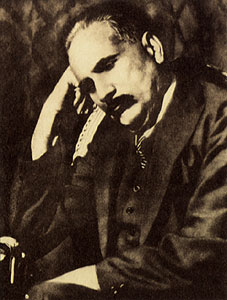“Democracy is a system in which heads are counted but not weighed.”
Quoted from Elst, Koenraad. Hindu dharma and the culture wars. (2019). New Delhi : Rupa.
Allama Iqbal , widely known as Muhammad Iqbal, was a poet, philosopher, and politician, as well as an academic, barrister and scholar in British India who is widely regarded as having inspired the Pakistan Movement. He is called the "Spiritual Father of Pakistan " He is considered one of the most important figures in Urdu literature, with literary work in both Urdu and Persian.
Iqbal is admired as a prominent poet by Pakistanis, Iranians and other international scholars of literature. Though Iqbal is best known as an eminent poet, he is also a highly acclaimed "Muslim philosophical thinker of modern times". His first poetry book, The Secrets of the Self, appeared in the Persian language in 1915, and other books of poetry include The Secrets of Selflessness, Message from the East and Persian Psalms. Amongst these, his best known Urdu works are The Call of the Marching Bell, Gabriel's Wing, The Rod of Moses and a part of Gift from Hijaz. Along with his Urdu and Persian poetry, his Urdu and English lectures and letters have been very influential in cultural, social, religious and political disputes.
In 1922, he was knighted by King George V, granting him the title "Sir". While studying law and philosophy in England, Iqbal became a member of the London branch of the All-India Muslim League. Later, during the League's December 1930 session, he delivered his most famous presidential speech known as the Allahabad Address in which he pushed for the creation of a Muslim state in northwest India.
In much of South Asia and the Urdu speaking world, Iqbal is regarded as the Shair-e-Mashriq . He is also called Mufakkir-e-Pakistan , Musawar-e-Pakistan and Hakeem-ul-Ummat . The Pakistan government officially named him "National Poet of Pakistan". His birthday Yōm-e Welādat-e Muḥammad Iqbāl , or Iqbal Day, is a public holiday in Pakistan.
Sir Muhammad Iqbal's house is still located in Sialkot and is recognized as Iqbal's Manzil and is open for visitors.

“Democracy is a system in which heads are counted but not weighed.”
Quoted from Elst, Koenraad. Hindu dharma and the culture wars. (2019). New Delhi : Rupa.
Educational Thinkers http://books.google.com/books?id=O6Fp2zaQVVMC&pg=PA151&dq=Muhammad+Iqbal+Brahmin&hl=en&ei=hJQaTKPPKMewcfnqzIEK&sa=X&oi=book_result&ct=result&resnum=4&ved=0CDoQ6AEwAw#v=onepage&q=Muhammad%20Iqbal%20Brahmin&f=false
Shikwa. https://archive.org/details/ShikwaJawabIShikwaIqbalsDialogueWithAllahTrKhushwantSinghIqbal
Shikwa & Jawab Shikwa : The complaint and the answer : the human grievance and the divine response
The Reconstruction of Religious Thought in Islam http://www.allamaiqbal.com/works/prose/english/reconstruction/index.htm
“"Heart – “It is absolutely certain that God does exist.””
stray reflections http://www.allamaiqbal.com/
The Secrets of Selflessness, Emperor Alamgir and the Tiger
These are the words of a great Muslim saint, 'AbdulQuddës of Gangoh. In the whole range of Sufi literature it will be probably difficult to find words which, in a single sentence, disclose such an acute perception of the psychological difference between the prophetic and the mystic types of consciousness. The mystic does not wish to return from the repose of "unitary experience"; and even when he does return, as he must, his return does not mean much for mankind at large.
Source: The Reconstruction of Religious Thought in Islam http://www.allamaiqbal.com/works/prose/english/reconstruction/index.htm
Source: The Reconstruction of Religious Thought in Islam https://www.google.com/books/edition/The_Reconstruction_of_Religious_Thought/uCh14nl09jkC?hl=en (1930), p. 14
“Nations are born in the hearts of poets; they prosper and then die in the hands of politicians.”
Stray reflections http://www.allamaiqbal.com/works/prose/english/strayreflections/index.htm
“Human intellect is natures attempt at self criticism”
stray reflections[http:www.allamaiqbal.com.htm]
Sir Muhammad Iqbal’s 1930 Presidential Address to the 25th Session of the All-India Muslim League, Allahabad, 29 December 1930 (from University of Columbia website http://www.columbia.edu/itc/mealac/pritchett/00islamlinks/txt_iqbal_1930.html)
“What if the song be Indian, it is Hejazi in its verve.”
Shikwa. According to some sources, a more literal translation is: "No matter if my idiom is Indian, my spirit is that of Hejaz." C.f. Elst, Koenraad (2014). Decolonizing the Hindu mind: Ideological development of Hindu revivalism. New Delhi: Rupa. p. 343.
Shikwa & Jawab Shikwa : The complaint and the answer : the human grievance and the divine response
Sir Muhammad Iqbal’s 1930 Presidential Address to the 25th Session of the All-India Muslim League, Allahabad, 29 December 1930 (from University of Columbia website http://www.columbia.edu/itc/mealac/pritchett/00islamlinks/txt_iqbal_1930.html)
Sir Muhammad Iqbal’s 1930 Presidential Address to the 25th Session of the All-India Muslim League, Allahabad, 29 December 1930 (from University of Columbia website http://www.columbia.edu/itc/mealac/pritchett/00islamlinks/txt_iqbal_1930.html)
Sir Muhammad Iqbal’s 1930 Presidential Address to the 25th Session of the All-India Muslim League, Allahabad, 29 December 1930 (from University of Columbia website http://www.columbia.edu/itc/mealac/pritchett/00islamlinks/txt_iqbal_1930.html)
“What if the pitcher be Persian, from Hejaz is the wine I serve.”
Shikwa & Jawab Shikwa : The complaint and the answer : the human grievance and the divine response
“All land belongs to the Muslims, because it belongs to their God.”
Source: Quoted from Elst, Koenraad (1992). Negationism in India: Concealing the record of Islam.
Source: Shikwa. https://archive.org/details/ShikwaJawabIShikwaIqbalsDialogueWithAllahTrKhushwantSinghIqbal
“O water of the river Ganges, thou rememberst the day
When our torrent flooded thy valleys...”
Source: quoted in Annemarie Schimmel - Gabriel's Wing_ Study into the Religious Ideas of Sir Muhammad Iqbal (1989, Iqbal Academy) also in Jain, M. (2010). Parallel pathways: Essays on Hindu-Muslim relations, 1707-1857.
“Every land which belongs to God is our land.”
As quoted in Islam and Nationalism, Dr. Ali Mohammed Naqvi . Also translated as: "All land belongs to Muslims, because it belongs to their God. in : JPRS Report: Near East & South Asia, 93067 Foreign Broadcast Information Service, 1993 https://books.google.com/books?id=rki6AAAAIAAJ
Source: The Reconstruction of Religious Thought in Islam https://www.google.com/books/edition/The_Reconstruction_of_Religious_Thought/uCh14nl09jkC?hl=en (1930), p. 42